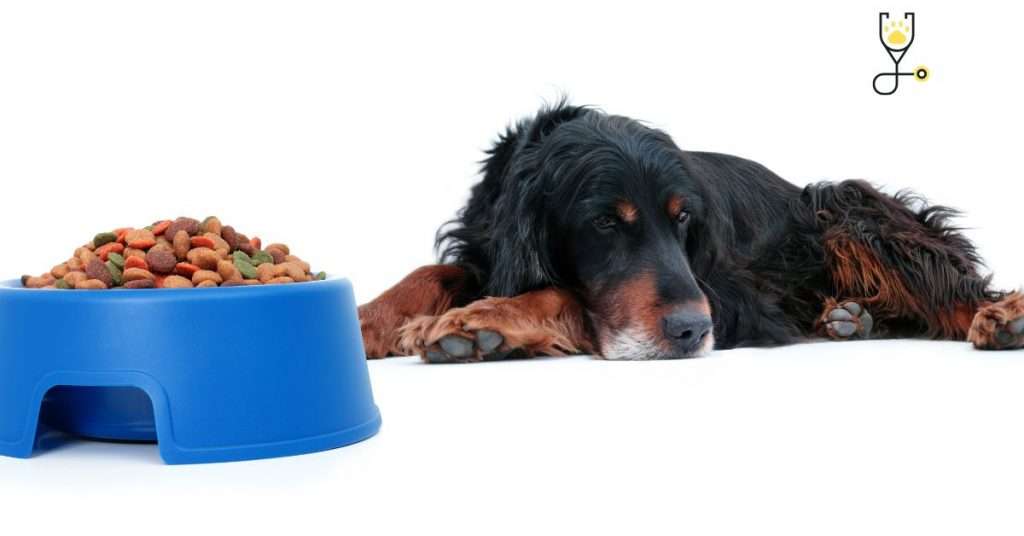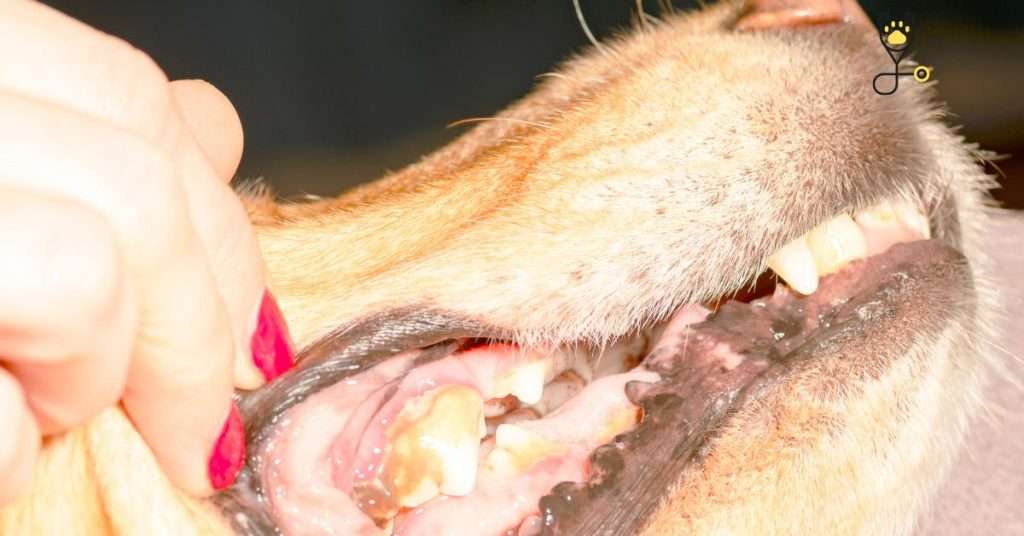If you are a dog owner, you know that your dog’s diet is important. You may have noticed that your dog is not eating as much lately, or maybe they are not eating at all. There are many causes for this behavior, and luckily there are also many treatments. In this blog post, we will discuss the causes and treatments of dogs who are not eating. Stay tuned for more information!
25 CAUSES-WHY IS MY DOG NOT EATING?

25 CAUSES-WHY IS MY DOG NOT EATING?
1. Loss of Appetite
2. Your Dog May be Sick or In Pain
3. Age-Related Changes
4. Dental Disease
5. gastrointestinal problems
6. Addison’s Disease
7. Cushing’s Disease
8. diabetes mellitus
9. EPI (Exocrine Pancreatic Insufficiency)
10. liver disease
11. kidney disease
12. cancer
13. heart disease
14. parasites
15. thyroids problems
16. food allergies or intolerance
17. picky eating habits (learn more about why some dogs are picky eaters)
18. stress and anxiety
19. depression
20. fatigue
21. old age
22. pregnancy or nursing
23. side effects of medication
24. changes in the environment (new house, new baby, etc.)
25. anxiety caused by changes in routine (owner’s work schedule, etc.)
1. Loss of Appetite

There are many possible reasons why your dog might have lost its appetite. If your dog has suddenly stopped eating, it’s important to find out why. Possible causes include illness, pain, stress, and changes in the environment. If your dog is sick or in pain, it may not feel like eating. Stress can also lead to a loss of appetite. If there’s been a change in the home (such as a new baby or pet), your dog may be anxious or stressed, which can lead to a decreased appetite.
2. Your Dog May be Sick or In Pain
If your dog is sick or in pain, it may not feel like eating. Many illnesses can cause a loss of appetite, so it’s important to take your dog to the vet if you notice a change in its eating habits. If your dog is in pain, it may not want to eat because moving around hurts. Dental disease, gastrointestinal problems, and cancer can all be painful and lead to a decreased appetite.
3. Age-Related Changes
As dog’s age, they may experience changes that lead to a loss of appetite. For example, older dogs may have trouble digesting food properly, which can make them lose their appetite. Dental problems are also common in older dogs and can lead to a loss of appetite.
4. Dental Disease

Dental disease is a common problem in dogs and can lead to a loss of appetite. If your dog’s teeth are painful, it may not want to eat. Dogs with dental problems may also drool more than usual and have bad breath.
5. Gastrointestinal problems
Gastrointestinal problems, such as intestinal parasites, can cause a loss of appetite in dogs. Intestinal parasites can make your dog feel sick and cause it to lose its appetite. If your dog has gastrointestinal problems, it’s important to take it to the vet so that the problem can be treated.
6. Addison’s Disease
Addison’s disease is a hormonal disorder that can cause a loss of appetite in dogs. Dogs with Addison’s disease may also vomit, have diarrhea, and feel weak and tired. If you think your dog may have Addison’s disease, it’s important to take it to the vet for treatment.
7. Cushing’s Disease

Cushing’s disease is a hormonal disorder that can cause a loss of appetite in dogs. Dogs with Cushing’s disease may also drink and urinate more than usual, pant excessively, and have a pot-bellied appearance. If you think your dog may have Cushing’s disease, it’s important to take it to the vet for treatment.
8. Diabetes mellitus
Diabetes mellitus is a condition that causes high blood sugar levels. Dogs with diabetes mellitus may drink and urinate more than usual, and they may also have an increased appetite. If you think your dog may have diabetes mellitus, it’s important to take it to the vet for treatment.
9. EPI (Exocrine Pancreatic Insufficiency)
EPI is a condition that affects the pancreas and can lead to a loss of appetite in dogs. Dogs with EPI may also have weight loss, diarrhea, and vomiting. If you think your dog may have EPI, it’s important to take it to the vet for treatment.
10. Liver disease
Liver disease can cause a loss of appetite in dogs. Dogs with liver disease may also vomit, have diarrhea, and feel weak and tired. If you think your dog may have liver disease, it’s important to take it to the vet for treatment.
11. Kidney disease
Kidney disease can cause a loss of appetite in dogs. Dogs with kidney disease may also drink and urinate more than usual, and they may also have vomiting and diarrhea. If you think your dog may have kidney disease, it’s important to take it to the vet for treatment.
12. Cancer
Cancer can cause a loss of appetite in dogs. Dogs with cancer may also have weight loss, vomiting, and diarrhea. If you think your dog may have cancer, it’s important to take it to the vet for treatment.
13. Heart disease
Heart disease can cause a loss of appetite in dogs. Dogs with heart disease may also have difficulty breathing, exercise intolerance, and coughing. If you think your dog may have heart disease, it’s important to take it to the vet for treatment.
14. Parasites
Parasites, such as intestinal worms, can cause a loss of appetite in dogs. Parasites can make your dog feel sick and cause it to lose its appetite. If your dog has parasites, it’s important to take them to the vet so that the problem can be treated.
15. Thyroids
Thyroid problems can cause a loss of appetite in dogs. Dogs with thyroid problems may also have weight gain or loss, hair loss, and changes in mood. If you think your dog may have a thyroid problem, it’s important to take it to the vet for treatment.
16. Food allergies or intolerance
Dogs can be allergic or intolerant to certain foods, which can lead to a loss of appetite. If you think your dog may have a food allergy or intolerance, it’s important to take it to the vet for treatment.
17. Picky eating habits (learn more about why some dogs are picky eaters)
Picky eating habits are often the result of a dog’s natural instinct to be cautious about new foods. If your dog is a picky eater, it’s important to introduce new foods slowly and to make sure that the food you’re offering is nutritious and appetizing.
18. Stress and anxiety
Dogs can experience stress or anxiety for a variety of reasons, including changes in their environment, separation from their owners, or being around other animals. If you think your dog may be stressed or anxious, it’s important to take it to the vet for treatment.
19. Depression
Dogs can suffer from depression just like people. If your dog is depressed, it may lose its appetite. If you think your dog may be depressed, it’s important to take it to the vet for treatment.
20. Fatigue
Dogs can become fatigued for a variety of reasons, including illness, heat exhaustion, and lack of exercise. If you think your dog may be fatigued, it’s important to take it to the vet for treatment.
21. Old age
As dog’s age, they may lose their appetite. This is often the result of a decrease in the production of digestive enzymes. If you think your dog’s loss of appetite may be due to old age, it’s important to take it to the vet for treatment.
22. Pregnancy or nursing
Dogs who are pregnant or nursing may lose their appetite. This is often the result of morning sickness or the increased demand for nutrients. If you think your dog’s loss of appetite may be due to pregnancy or nursing, it’s important to take it to the vet for treatment.
23. Side effects of medication
Certain medications, such as antibiotics, can cause a dog to lose its appetite. If you think your dog’s loss of appetite may be due to medication, it’s important to take it to the vet for treatment.
24. Changes in the environment (new house, new baby, etc.)
Dogs can be sensitive to changes in their environment, which can lead to a loss of appetite. If you think your dog’s loss of appetite may be due to a change in the environment, it’s important to take it to the vet for treatment.
25. Anxiety caused by changes in routine (owner’s work schedule, etc.)
Dogs can be anxious when their routine is changed, which can lead to a loss of appetite. If you think your dog’s loss of appetite may be due to anxiety, it’s important to take it to the vet for treatment.
Read More: Seizures in dogs-symptoms, causes, & treatments
HOME TREATMENTS-WHY IS MY DOG NOT EATING?

1. Give your dog time to adjust to new surroundings or changes in routine. If you’ve recently moved or made changes to your work schedule, give your dog some time to adjust before expecting it to return to its usual appetite.
2. Make sure your dog has access to fresh water. A dog who is not drinking enough water is more likely to have a loss of appetite.
3. Feed your dog small meals frequently throughout the day. If your dog is not eating much at one time, try feeding it smaller meals more often throughout the day.
4. Try different types of food. If your dog is a picky eater, try offering different types of food to see if there is something it likes better.
5. Take your dog to the vet for a check-up. If you are concerned about your dog’s loss of appetite, take it to the vet for a check-up to rule out any medical conditions.
6. Try a supplement. If your dog is not getting enough nutrients, you may want to try a supplement to help boost its appetite.
7. Give your dog plenty of exercises. A dog who is not getting enough exercise may be less likely to have an appetite.
8. Make sure your dog is not left alone for long periods of time. Dogs can get anxious when they are left alone, which can lead to a loss of appetite.
9. Try relaxation techniques. If your dog is anxious, try some relaxation techniques, such as massaging its back or playing soft music.
10. Talk to your vet about medication. If your dog’s loss of appetite is due to anxiety or another psychological condition, your vet may prescribe medication to help.
Learn All About Common Health Issues in Dogs & Their Prevention in our detailed guide here.
MEDICINES USED TO TREAT DOG’S APPETITE
There are a number of different medicines that can be used to treat a dog’s appetite. Some of these include:
1. Antidepressants
2. Appetite stimulants
3. Hormones
4. Metabolic regulators
5. Nutritional supplements
6. Probiotics
7. Vitamins
8. Surgery (for certain medical conditions)
Talk to your vet about which type of medicine is right for your dog.
CONCLUSION
A dog’s loss of appetite can be caused by a number of different factors. If you are concerned about your dog’s loss of appetite, it’s important to take it to the vet for a check-up. There are a number of different medicines that can be used to treat a dog’s appetite, so talk to your vet about which type of medicine is right for your dog.
Read More About: How To Check Your Pup’s Temperature?
FAQS
My dog is not eating and seems to be losing weight. Should I be concerned?
If your dog is not eating and seems to be losing weight, you should take it to the vet for a check-up. There may be an underlying medical condition causing the loss of appetite.
What are some common causes of a dog’s loss of appetite?
Some common causes of a dog’s loss of appetite include illness, stress, anxiety, changes in routine, medication side effects, and changes in the environment.
How can I treat my dog’s loss of appetite at home?
There are a number of things you can do to treat your dog’s loss of appetite at home, such as: feeding small meals frequently throughout the day, trying different types of food, giving your dog plenty of exercises, and making sure your dog is not left alone for long periods of time. If you are concerned about your dog’s loss of appetite, talk to your vet about which treatment option is right for your dog.
What type of medicine can be used to treat a dog’s loss of appetite?
There are a number of different medicines that can be used to treat a dog’s loss of appetites, such as antidepressants, appetite stimulants, hormones, metabolic regulators, nutritional supplements, probiotics, vitamins, and surgery (for certain medical conditions). Talk to your vet about which type of medicine is right for your dog.
Why is my dog not eating?
There could be a number of reasons why your dog is not eating, such as illness, stress, anxiety, changes in routine, medication side effects, and changes in the environment. If you are concerned about your dog’s loss of appetite, take it to the vet for a check-up.